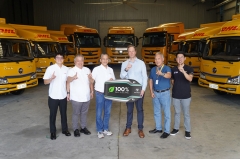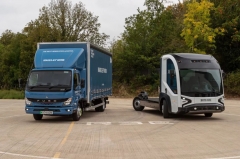
Right now, the majority of car and truck manufacturers are looking to find ways to cut down on carbon emissions as well as find alternatives to fossil fuels. One alternative to fossil fuels that manufacturers are examining is biogas, a fuel generated from various raw materials including agricultural waste, manure, municipal waste, plant material, and food waste among others. Since the production of raw materials into biogas can be done much quicker than the earth’s natural process of producing crude oil, biogas is seen as a viable replacement for fossil fuels in powering vehicles.
Scania, a Swedish manufacturer of commercial vehicles, has just unveiled its latest generation of biogas engines which they say offer five percent more fuel efficiency when compared to its predecessor. These engines were unveiled for the first time at the previous year's IAA show in Hanover, Germany, the latest 13-litre biogas engines are now offered in 420 hp or 460 hp variants.
“Biomethane fuels are the solution for those customers who want to start a decarbonisation journey without any delay. Our biogas engines cover a wide span of industries and applications. A 40-tonne tractor-and-trailer combination can achieve ranges of up to 1,800 km when specified with the biggest Bio-LNG tank solutions that we offer. Add the 460hp and the 2,300Nm engine and you have a perfect tool for European long-haul.”
These engines incorporate components from Scania’s advanced Super diesel powertrain, enhancing their fuel efficiency. When coupled with G25 gearboxes and axles, extensive testing has demonstrated that operators may experience up to five percent fuel savings during long-haul operations. These engines represent an evolution of Scania’s older 13-litre gas units, boasting increased power outputs and readiness to meet upcoming regulatory requirements.

Scania also noted that biogas filling stations are swiftly advancing throughout Europe, propelled by a surge in demand and the active involvement of key players in the fuel industry. In addition, the brand also says that minimizing the CO2 footprint is no longer exclusive to environmentally conscious companies seeking public recognition; it has become an imperative for most committed transporters, compelling them to employ all available measures.
Adding further, Ola Henriksson, said: “With the CO2 reductions, the driveability, and the ranges we offer now, I’m convinced that more customers will recognize what a great solution this is.”
Here in the Philippines, biogas production as an alternative fuel source has only started to pick up momentum. The use of biogas in the country is limited only to private usage or for powering small establishments. Unfortunately, with the current popularity of alternative fuels in the country, don’t expect biogas-powered trucks to be adopted here in the Philippines soon.









